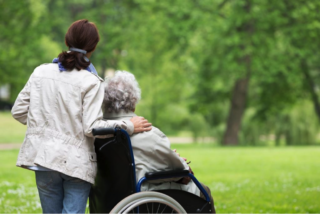
More Senior Health Articles
The Types of Negligence Residents of an Assisted Living Facility Suffer

Assisted living facilities offer a level of care that bridges the gap between independent living and nursing homes. While they provide essential support for daily activities, negligence in assisted living facilities can still occur, jeopardizing the well-being of residents.
Given how frail residents in nursing homes are, they are prone to accidental falls, resulting in broken hips and other injuries. If a loved one has experienced such a condition, it’s crucial to get legal help for a broken hip at Hughey Law Firm.
Understanding the different types of neglect allows you to identify potential warning signs and take action.
Neglect of Basic Needs
This fundamental form of neglect involves failing to provide residents with the essential care they require to thrive. Examples include:
- Inadequate nutrition and hydration: Residents may not receive meals that meet their dietary needs or assistance with eating and drinking, leading to malnutrition and dehydration.
- Poor hygiene and sanitation: Residents may be left unbathed or unclothed for extended periods, and their living environments may not be properly cleaned or sanitized, increasing the risk of infections.
- Lack of medication management: Staff may fail to administer medications correctly or on time, potentially causing adverse health effects.
Medical Neglect
This type of neglect occurs when a resident’s medical needs are ignored or inadequately addressed. This can include:
- Failing to monitor health conditions: Staff may neglect to monitor vital signs, check for wounds or infections, or recognize signs of illness, delaying necessary medical interventions.
- Ignoring requests for medical attention: Residents’ concerns about their health may be dismissed or left unattended, leading to a worsening condition.
- Improper wound care: Untreated or improperly treated wounds can become infected and lead to serious complications.
Safety Neglect
Assisted living facilities have a responsibility to ensure a safe environment for residents. Safety neglect can encompass:
- Insufficient supervision: Leaving residents unattended who are at risk of falls, wandering, or elopement.
- Failure to maintain the facility: Neglecting to repair broken equipment, malfunctioning call buttons, or uneven walkways can increase the risk of accidents.
- Improper use of restraints: Restraints should only be used as a last resort and under proper medical supervision. Misusing restraints can cause physical and emotional harm.
Social and Emotional Neglect
Social interaction and emotional well-being are crucial for residents’ mental health. Social and emotional neglect can manifest as:
- Isolation and loneliness: Denying residents opportunities for social interaction with staff and other residents can lead to depression and withdrawal.
- Lack of stimulation: Failing to provide mentally stimulating activities can lead to cognitive decline and boredom.
- Ignoring emotional needs: Residents’ emotional distress or requests for help may be disregarded, causing feelings of loneliness and despair.

Financial Exploitation
Sadly, some assisted living facilities may exploit residents financially. This can include:
- Misusing resident funds or belongings: Staff may steal money or valuables from residents, or misuse their funds for personal gain.
- Pressuring residents for unnecessary services or charges: Facilities may coerce residents into paying for services they don’t need or want.
- Forgery or identity theft: In extreme cases, caregivers may steal residents’ identities or forge documents to access their financial resources.
Warning Signs of Neglect
If you suspect a loved one may be a victim of neglect in an assisted living facility, be aware of these warning signs:
- Unexplained weight loss or dehydration
- Bedsores or unexplained injuries
- Poor hygiene or an unkempt appearance
- Listlessness, depression, or social withdrawal
- Unsanitary living conditions
- Unexplained changes in medication or finances
Getting Help
If you suspect neglect, it’s crucial to take action. Here’s what you can do:
- Document everything: Keep detailed notes of your observations, including dates, times, and any specific concerns.
- Talk to the facility staff and director: Express your concerns directly and document their response.
- Report the neglect to authorities: Contact your state’s Adult Protective Services agency.
- Seek legal help: An attorney specializing in elder abuse and neglect cases from Hughey Law Firm can advise you on your legal options and help ensure your loved one receives the care and respect they deserve.
Protecting Our Vulnerable Population
By raising awareness of the different types of neglect in assisted living facilities, we can empower families to advocate for their loved ones and hold negligent facilities accountable.
Other Articles You May Find of Interest...
- Five reasons meditation can be important for the elderly
- The Types of Negligence Residents of an Assisted Living Facility Suffer
- 3 Types of Exercises Best for Seniors With Arthritis
- Independence Boost: How Medical Alerts Help Chronic Conditions
- Over-the-Counter Hearing Aids (OTC)
- Therapeutic In-Home Sauna Service for Homebound Seniors
- Staying Active and Engaged: A Guide to Enhancing Senior Wellbeing

















